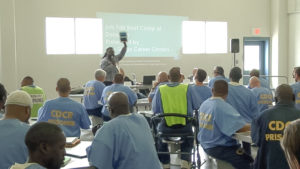 Following the first ever job fair held inside a San Diego County jail at the East Mesa Reentry Facility in 2017, in April we coordinated the first ever job fair inside a state prison located in the county—the Richard J. Donovan Correctional Facility—as well as a preparation event. The idea came by way of Julie Ermao at Donovan.
Following the first ever job fair held inside a San Diego County jail at the East Mesa Reentry Facility in 2017, in April we coordinated the first ever job fair inside a state prison located in the county—the Richard J. Donovan Correctional Facility—as well as a preparation event. The idea came by way of Julie Ermao at Donovan.
The Manhattan Institute published a report in 2015 that says “training designed to quickly place former inmates in jobs significantly decreases the likelihood that ex-offenders with nonviolent histories will be rearrested. Only 31.1 percent of nonviolent ex-offenders who received enhanced training were arrested during the 18 to 36 months in which they were tracked, compared with 50 percent of similar participants who received standard training.”
Before and during incarceration, many of those incarcerated at Donovan have been earning certifications, degrees and diplomas—credentials that increase one’s chances of getting a job.
With recent legal measures in California enacted by former Governor Jerry Brown, some inmates who were given life sentences as youth offenders will face the parole board over the next two years to have their sentences reconsidered.
While many of the individuals our staff met with at the event fell into this category, there were also many who have served the minimum sentences and will go before the parole board for potential release over the next year.
 The job fair preparation event on April 4 included training for inmates offered by KRA Corporation, the operator of our career centers, and the Workforce Partnership.
The job fair preparation event on April 4 included training for inmates offered by KRA Corporation, the operator of our career centers, and the Workforce Partnership.
As long-term success and reintegration into society depend heavily on employment upon exit from incarceration, plans must include clear pathways to careers. To that end, inmates learned how to develop a resume and a personal commercial, as well as finding hope and tying employment back to overall stability and reducing recidivism rates.
The training event concluded with a panel featuring Go Staff, a San Diego Temporary Agency, and legal assistance through The Reconcile Foundation.
The job fair itself took place the following week, where resource providers including housing and vocational rehabilitation services met with clients face to face. Several apprenticeship programs and employers were willing and ready to hire the inmates once they are released.
We can greatly reduce recidivism and empower formerly incarcerated individuals to become active and contributing members of our community in the future when workforce development takes place before inmates are released from incarceration.
Some takeaways from the events:
- Helping to reduce fears and introduce inmates to potential employers can go a long way to individuals creating a release plan that includes employment.
- Connecting resources and employers is also a key element in the success of those who are returning from incarceration.
- Inmates who have served long incarceration sentences have the lowest recidivism rates.
- Employment is a key factor in maintaining stability and avoiding the pitfalls that cause recidivism.
- Inmates, when given the opportunity, opt to take courses and increase educational opportunities. If developed properly, these educational opportunities should include job readiness and opportunities for training that align with the priority sector
If you represent an employer or business interested in participating in the reintegration of our returning citizens and hire from this talent pool, there are a couple of ways you can participate:
- Consider joining the reentry roundtable, which meets the third Tuesday of each month at the Metro Career Center. The collaboration between entities affords a space to learn, strategize and get informed about the latest legislation and population that will be reentering the community. With collaboration between housing providers, parole, probation, correctional institutions, local employers, state and county oversight, and community advocates, we can ensure smooth transitions including employment placements.
- Consider hiring someone who identifies as formerly incarcerated. Learn more about the Work Opportunity Tax Credit (WOTC) that provides tax incentives for employers.
